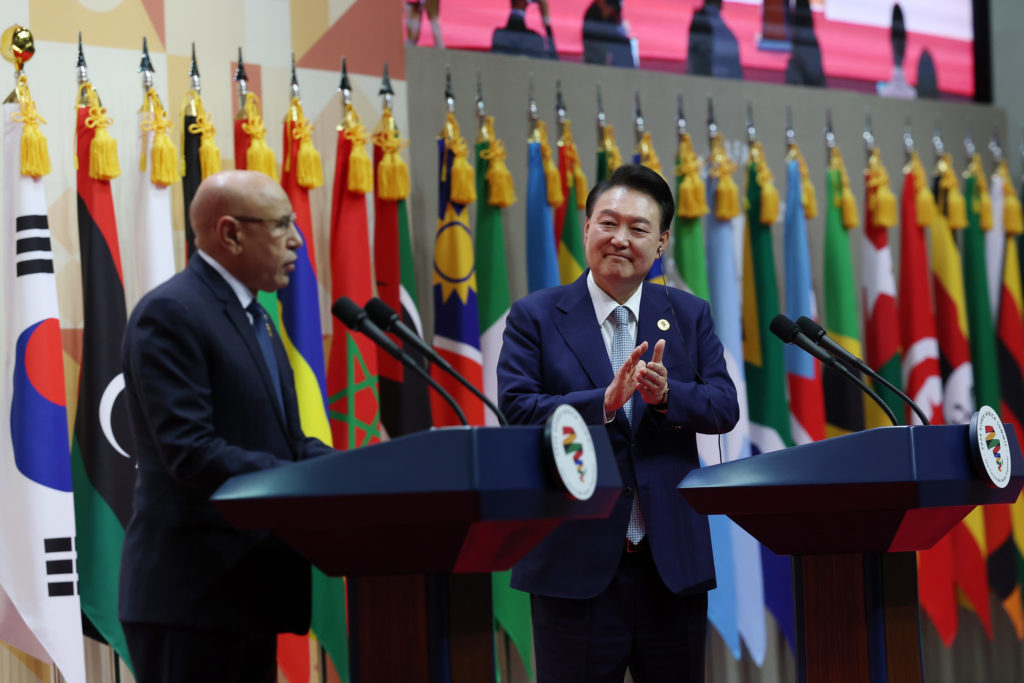
South Korean President Yoon Suk Yeol and the leaders of African countries agreed on Tuesday to forge deeper trade and business cooperation and launched a “critical minerals dialogue” aimed at sustainable development of the continent’s resources.
Hosting a first-ever summit with the leaders of 48 African nations, Yoon said South Korea would increase development aid for Africa to $10 billion over the next six years as it looks to tap the continent’s rich mineral resources and potential as a vast export market.
“The Critical Minerals Dialogue launched by South Korea and Africa will set an example for a stable supply chain through mutually beneficial cooperation and contribute to sustainable development of mineral resources around the world,” Yoon said in his closing remarks.
He also pledged to offer $14 billion in export financing to promote trade and investment for South Korean companies in Africa.
South Korea is one of the world’s largest energy buyers and is home to leading semiconductor producers. It is also home to the world’s fifth-largest automaker, Hyundai Motor Group, which is making a push for electrification.
Partnering with Africa, which has 30% of the world’s reserves of critical minerals including chrome, cobalt and manganese is crucial, Yoon’s office has said.
In a joint declaration issued by South Korea, the African Union (AU) and its member nations, the leaders pledged to speed up talks for economic partnership agreements and trade and investment promotion frameworks.
They also called for advancing cooperation for Africa’s food security with South Korea’s support with agricultural technology and smart farming.
African leaders welcomed South Korea’s “Tech4Africa” initiative aimed at supporting the education and training of Africa’s young population.
AU chair and Mauritanian President Mohamed Ould Ghazouani, at a joint news conference with Yoon, said African countries were looking to learn from Korea’s experience in developing human resources, industrialization and digital transformation.
Yoon said 33 heads of state participated in the summit.
Yoon has proposed “shared growth” as a pillar of cooperation with the continent and said the leaders agreed to expand trade and investment by establishing institutional frameworks to facilitate them.
By reaching out with offers to help with industrial infrastructure and digital transformation, South Korea is trying to tap into a vast and fast-growing market that is home to 1.4 billion people, the majority of whom are 25 or younger.
The joint declaration said the leaders recognized the instability of global supply chains, and that future industries increasingly depended on the stable supply of mineral resources.
“In this context, we agree to launch the Korea-Africa Critical Minerals Dialogue during this summit which will serve as an important institutional foundation for enhancing cooperation between Korea and Africa,” it said.
Park Jong-dae, a former South Korean ambassador to South Africa and Uganda, argued Western and Chinese models of development had failed African nations, and South Korea offered a valuable alternative path.
“The essence of the Korean model of development cooperation is human development, and about management, rather than about provision of assistance per se,” he said.
“Korea has the experience and know-how of development … while many African countries have immense possibilities for development based on yet to be explored, untapped resources and endowment, and dynamic young population,” he said.
On Wednesday, South Korean business leaders will host a business summit focused on investment, industrial development and food security.
Yoon separately held talks with 25 leaders on the sidelines of the summit, his office said.
Yoon agreed with the leaders of Tanzania to provide $2.5 billion concessional loans and Ethiopia for $1 billion financing to go to infrastructure, science and technology and health and urban development.
Kenyan President William Ruto said South Korea would provide $485 million concessional development funding.
(By Jack Kim, Hyonhee Shin, Josh Smith and Hyunsu Yim; Editing by Jamie Freed and Alex Richardson)
Comments